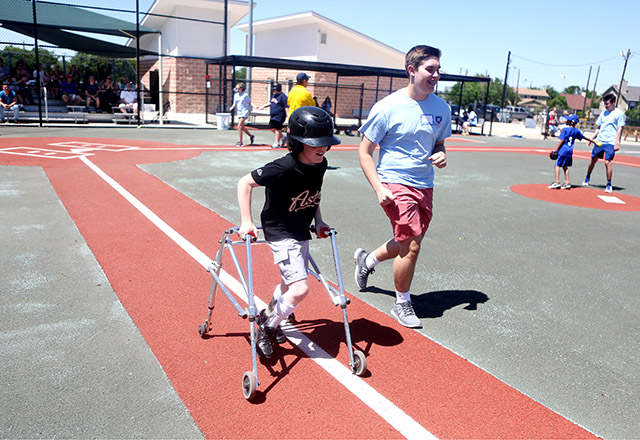Austin Miracle League a Home Run for Disabled Children

Bradyn Taylor and his buddy, Ian Hankes, run toward first base during a baseball game between the Astros and the Dodgers. The Miracle League at Town and Country, based in Northwest Austin, caters to children who have cognitive and physical disabilities. Photo by Shweta Gulati.
By Mercedes Cordero
For Reporting Texas
It’s the bottom of the first and the Cardinals and Pirates are tied with no runners on. Six-year-old Josiah whacks one to left. With his buddy running beside him, Josiah scores.
The Austin Miracle League’s 17th season is under way. Miracle League players look forward to an inspiring season in a game where no player gets tagged out and everyone wins.
The Miracle League is an international nonprofit baseball organization for youth with physical and cognitive disabilities. It was founded in 1998 in Georgia, and now there are 250 teams worldwide including players with cerebral palsy, Down syndrome, cancer, and children who have survived a major accident. The Miracle League at Town and Country, based in Northwest Austin, now has 207 players, 280 buddies, 29 coaches more than 40 other volunteers.
The teams use professional baseball team names to give the kids an opportunity to play for their favorite pro team. Games are two innings and last about an hour. Everybody bats, nobody is out and everybody scores. Each player has a personal coach throughout the game whose job it is to help and protect them on the field along with facilitating player participation.
“Buddies are probably seeds to the player’s growth,” said Tracey Brown, who coordinates the buddies. “With the buddies there with them it allows them to build a relationship with the each other and the game itself.”
After Josiah scores, the next player picks up a plastic Spiderman bat and adjusts his stance at the plate. He looks over the diamond occupied by more than 20 players and their helpers. Second and third base are covered by two players in wheelchairs.
Heather Hackett looked on as her daughter, 8-year-old Samantha, joined her team.
“Samantha, she can’t talk,” Hackett said. “She has severe autism that prevents her from communicating with us and us with her.”
Hackett heard about Miracle League through one of Samantha’s school friends and has been with the league for three years.
“Over the years we have noticed that Samantha has learned to really like coming out and playing,” Hackett said. “Every time she sees her baseball hat she is ready to go and sometimes she says ‘baseball’. It is very exciting.”
Johnathon Chubbs, 18, is one of the oldest members of the Red Sox. Chubbs, who has autism, has been part of the league since he was 6. He’s a slow runner, his mother said, but loves to run in baseball.
“Johnathon enjoys being out there,” Sherise Hunter said. “He is most proud of himself when he is able to tell people he is an athlete.”
The Austin league was started by Steve Brown, a longtime volunteer and new member of the Town and Country Optimist Club board in Austin, and Adam Weisberg, the owner of local fast food restaurant Zen. The two men had seen an HBO program featuring the national Miracle League. Brown later told the Optimist Club board: “We’re doing a great job serving the youth of northwest Austin, but we’re not serving all of the kids.”
The league now serves 300 children a month in Texas.
The Miracle League has helped many kids build their confidence but has had challenges as it continues to grow. The biggest challenge is finding adults who have the time and passion to volunteer.
“Our Miracle League requires a great deal of organization and time during the season,” Tracey Brown said. “It is hard to find individuals that want to put in that kind of time.”
Another challenge is funding the league and maintaining facilities. To provide a safe place for the children, a special playing surface and complex was built for potential safety hazards associated with dirt and grass. The cost was about $500,000. Brown’s initial effort in Austin raised the $750,000 to build the specially constructed field, plus buildings for concessions, storage and restrooms.
The league also partnered with The Round Rock Express, the Triple A affiliate of the Texas Rangers. The field, located in Northwest Austin, was named the Round Rock Express Miracle League Field.
“We want to make these kids feel part of something,” Tracey Brown said.
Kaylie Dittmer, 16, first joined the Miracle League as a buddy after her older brother joined. “It feels good to come out here and help these kids because I know that they look forward to coming out here and playing all week,” she said.
“I am glad that I became a buddy,” said Cam Davis, 16. “The one thing that always stays with me is that my buddy, Hayden, is always happy to see me. He really likes when I pick him up and spin him around. He knows he can be himself when he is around me.”
As both a parent of a player and as a buddy, Danny Guerra said being out every weekend with his family is the most memorable part.
“My son, Danny, enjoys coming out here,” Guerra said. “His facial expressions say it all when he is on the field.”
Tracey Brown said baseball can be therapeutic for participants.
“We say no to no special need, mental or physical disabilities,” Brown said. “Every child out on the field has an opportunity to grow and finally play a team sport just like every other child their age.”